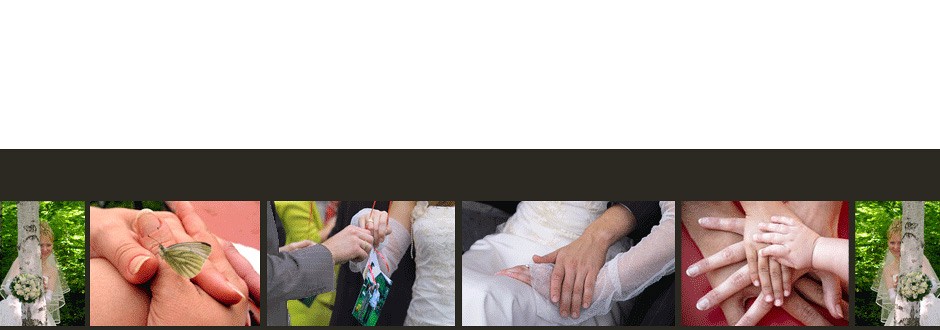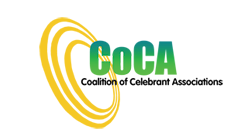Essential knowledge:
The candidate must be able to demonstrate essential knowledge required to effectively do the task outlined in elements and performance criteria of this unit, manage the task and manage contingencies in the context of the identified work role
These include:
- Awareness of the history of ritual and ceremony, including both religious and secular focus
- Function and importance of ritual (ceremony/ group support) and story telling times of change, and in particular human life stages from birth to death
- Broad understanding of the role of the celebrant in Australian culture in 21st century
- Structure and function of ceremony and role of celebrant
- The public role and legal importance of different kinds of ceremony
- Recognition of range of ritual and ceremonial expression across different cultures
- Understanding of how ceremonies signpost a culture
- Benefits of ceremony and ritual to society
- Art and craft in the delivery of ceremony
- Broad knowledge of stages of human development and psychology of change
- Understanding of importance in relation to celebrancy of:
- client centred focus
- ethical and moral issues
- distinctions between religious and civil ceremony content i.e. Church vs State issues
- Legal and practical information, such as:
- Awareness of Commonwealth, State and Territory discrimination laws
- Detailed knowledge of responsibilities in accepting a statutory declaration (Statutory Declarations Act 1959)
- Copyright Act (1968) especially applicability of the use of material in ceremonies
- Understanding that celebrants have an obligation to protect privacy and maintain confidentiality (Privacy Act 1988)
- Understanding of obligations relevant to operating as a celebrant within the Trade Practices Act (Trade Practices Act 1974)
- Understanding and awareness of cultural rights, multicultural contributions, and the place of the arts in culture and ceremony
- Understanding of and committed attitude to ongoing professional development
- Conflict of interest issues in a celebrancy role
- Resources and associated costs required to establish, support and maintain a celebrancy service/home based small business, including:
- insurance (public liability, professional indemnity, accident and other)
- professional association membership
- professional development
- Current knowledge of WHS issues and management of potential emergency situations as they apply to the celebrancy work role and range of work environments, including:
- legal requirements relating to WHS
- basic hazard identification procedures such as venue/environmental inspections and review of associated safety information and procedures
- principles of basic risk assessment
- hierarchy of control and its application in risk management
- processes for raising WHS issues, reporting hazards, incidents and injuries and WHS issue resolution
- potential emergency situations, alarms and signals and appropriate response
Essential knowledge:
The candidate must be able to demonstrate essential knowledge required to effectively do the task outlined in elements and performance criteria of this unit, manage the task and manage contingencies in the context of the identified work role
These include knowledge of:
- Relevant legislative and statutory requirements and provisions relating to provision of celebrancy services
- Standards and code of ethics relevant to celebrancy
- Stages of human development and broad knowledge of psychology of change as a basis for determining specific nature of client requirements
- Recognition of range of ritual and ceremonial expression across different cultures
- Understanding of importance in relation to celebrancy of:
- client-centred focus
- ethical and moral issues
- distinctions between religious and civil ceremony content i.e. Church vs State issues
- Understanding and awareness of cultural rights, multicultural contributions, and the place of the arts in culture and ceremony
DRAFT ONLY
Detailed Job Description – Celebrant / Civil Celebrant
JOB DESCRIPTION
1. TITLE OF POSITION: Civil Celebrant /Celebrant
2. CLASSIFICATION LEVEL: Self employed / Employed by a religious organisation.
3. SECTION / PROGRAM: Client Services – Celebrancy
4. POSITION OBJECTIVES:
(a) Objectives of Celebrant role
To assist individual, couples, families and communities to adapt to life changes, whether that be a change in role, function or circumstances within the person’s control or not.
These objectives may be achieved by facilitating, designing and/or delivering a ceremony or celebration or celebrancy related service appropriate to meet the physical, emotional, developmental, psychological/ spiritual, social and cultural needs of the client and their guests.
5. REQUIREMENTS FOR THE JOB:
(a) Skills required:
Reading and Comprehension
Ability to read a wide range of information on ceremony, celebration and associated information.
Applying that information to one’s role as a celebrant in relationship to one’s clients and their guests; the design, delivery and review of the ceremonies and celebrations offered by the celebrant; the ongoing development and review of one’s celebrancy practice.
Analytical Skills:
Ability to analyse the impact of life changes on the individual, couple, family or community from all relevant aspects ie physically, emotionally, developmentally, psychologically/ spiritually, socially and culturally for the client and guests
Ability to analyseand identify the most appropriate mode of operation as a celebrant in both the short and long term, given an understanding of one’s own character, skills, resources, support, life circumstances, one’s community and its needs.
Planning and Evaluation Skills:
Ability to research relevant information in relation to one’s role; all aspects of rites of passage/ ceremony or celebration; and related support services.
Ability to facilitate, plan, and/or evaluate a ceremony/ celebration, community information session or related event to meet the needs of the client/s or other participants and their quests.
Ability to develop and monitor a plan for the development of one’s professional celebrancy practice.
Ceremonial Design, Communication, Negotiation and Performance Skills:
Ability to communicate effectively, verbally and in writing.
Ability to negotiate with one’s clients; all aspects of the ceremony/ celebration, one’s role as celebrant and the terms and conditions of the professional service being contracted between oneself and the client.
Ability to create appropriate text, rituals, symbols and other ceremonial aspects of the performance event with one’s clients, which have relevance to the clients and guests regarding the particular life change being acknowledged and/ or celebrated
Ability to design and deliver an inclusive, meaningful and respectful ceremony or celebration to meet the individual needs of the client/s and their guests (or other participants)? .
Ability to provide leadership in the ceremony and to perform the role of celebrant with clarity, empathy, flexibility and with appropriate emphasis to the emotional, psychological/ spiritual, social and cultural aspects of the ceremony so that all participants are actively engaged with the ceremony/ celebration.
Organisational Skills:
Ability to organize all aspects of the ceremony and the ceremonial space, including participants, plus resources such as audio-visual equipment, ceremony symbols and other props.
Ability to organize one’s own work flow and all aspects of one’s celebrancy private practice, including one’s business needs, insurance and copyright cover, ongoing professional development, internet and website resources, telecommunications, computer, stationery, public address system, etc.
Small Business Skills:
Ability to develop and manage one’s celebrancy private practice using a range of business skills such as; business planning, sales and marketing, making service contracts with clients, invoicing and receipting of fees, accounting and financial management, information technology and computer skills, business and other licensing, other business requirements (e.g. insurance, copyright cover), record keeping, maintenance of office space and equipment, and ceremony related equipment such as PA systems etc.
Ability to meet obligations relevant to operating as a celebrant in relation to business activities: Taxation, the Trade Practices Act (Trade Practices Act 1974), Workplace Safety, Copyright, Anti-Discrimination, etc.
Professional Skills
Ability to act in a professional manner in all activities related to the civil celebrant role.
Commitment to; networking with celebrant colleagues in local celebrant networks and professional celebrant associations; ongoing professional development and to contributing to the professional development of celebrancy as a full-time occupation for those celebrants who wish to work as full-time celebrants.
Presentation, Information and Referral Skills:
Ability to provide informationto individual, couples, families and communities in clear plain
English in a variety of media and to refer appropriately and effectively to other services as required.
Ability to present information sessions to community and other groups on the independent celebrant’s role, specific ceremonies and /or celebrancy related services, using audio-visual equipment as required.
Interpersonal and Interviewing skills:
Ability to build rapport with people from different socio-economic, educational, religious and cultural backgrounds.
Ability to obtain relevant information from individuals, couples and families as required for the ceremony design and delivery, and as required for legal purposes.
Ability to communicate with honesty, empathy, tolerance, compassion and express opinions in a non-judgmental manner when appropriate
Ability to handle situations where differences or conflict between various client’s and/ or participants affect the planning and/or delivery of the ceremony or celebration.
Ability to develop and maintain ongoing relationships with one’s clients and community as a Family/ Community Celebrant.
Creative Writing Skills
Ability to integrate the information provided by individuals, couples and families and from other sources to create a meaningful and appropriate ceremony/ celebration for the specific circumstances required.
Ability to write content to increase public awareness of the role of civil celebrants and for promotion of one’s celebrancy services via websites, blogs, magazines, and other media
Group Works Skills
Ability to work with groups of people and work within a team environment.
Ability organize and stage manage rehearsals for ceremony / celebration.
Ability to plan, deliver and assess information / educational based community education sessions to promote the role of civil celebrants, the importance of civil celebrations in the fabric of a multicultural society, the value of meaningful celebrations to building stronger relationships, families and communities
(b) Knowledge required:
Importance and function of ritual, ceremony, story telling times and group support in times of change, and in particular, for human life stages from birth to death
Knowledge and understanding of the history of the celebrant’s role / ceremony and celebration (religious, spiritual and secular) in relation to transition and rites of passage
o The History of ritual and ceremony, including both religious and secular focus
o Recognition of range of ritual and ceremonial expression across different cultures
o Cultural rights, multicultural contributions, and the place of the arts in culture and ceremony
o Understanding of how ceremonies signpost a culture
o The public role and legal importance of different kinds of ceremony
o Benefits of ceremony and ritual to society, to community and family life
Knowledge of the principles and processes of transition, with the association loss and grief issues and potential for growth and change
o Knowledge of stages of human development, associated physical, psychological, social, community and cultural factors/ influences and concepts of dependency, independence and inter-dependency
o Understanding of the role of ceremony and celebration and its importance and relevance to the client and participants in the everyday lives of Australians and their physical, emotional, psychological/ spiritual, religious, family/ community, social and cultural needs.
An understanding of the importance of ceremonies and celebrations as healthy ways to strengthen individuals, families and build communities
An understanding of the important role of independent civil celebrant in a multicultural society such as Australia
o The history of ceremony and celebration in Australia
o The history and role of the civil celebrant in Australian culture in 21st century
o The role of civil ceremonies in a multicultural secular society such as Australia
Understanding of symbols, metaphors and story telling in the arts, and especially in performance arts, and their role in the psychology of change
· Structure and function of ceremony and role of celebrant
- The purpose of ceremony - for the primary clients and for other participants
- Knowledge of cultural issues in service delivery
- Knowledge and understanding of community issues and resources in relation to specific rites of passage
- Types of ceremonies – Love, Life and Loss
- Examples of types of ceremonies and celebrations
– Love (betrothal/ engagement, marriage, civil union, commitment, renewal of vows, wedding anniversaries)
- Life (christening/ baby blessings/ namings, coming of adolescent, coming of age, graduation, major birthdays such as 21st, 40, 60, 65, 70 etc, retirement, house warmings, coming of wisdom age, liferals, boat blessings,) and
- Loss (funerals, memorials, civil community memorials, companion animals funerals, divorce, living wakes, community ceremonies re natural disasters eg flood, bush fire) - The relation between ceremony and performance arts – ceremony as ‘non-fiction’ theatre, art and craft in the delivery of ceremony
- The elements of communication (all 6 senses), differences in communication styles and impact for individuals and groups
- Symbols and metaphors, their importance for integration of complex ideas and meanings
- Knowledge of a wide range of poetry, prose, music and symbols appropriate for ceremonies whether love, love or loss as their major focus
- Knowledge of the range of information required for developing a life story from ‘whole’ person perspective
- Determining specific nature of client requirements based upon stages of human development and psychology of change
- The structure, elements and organisation of ceremony / celebration
- the warm-up (and group bonding), welcome, introduction (including statement of purpose)
- story telling, reflection, heightening the “gap/ transition”, life coaching/ inspiration, the speaking one’s truth, the promises
- the capturing of memories, preparation for the next stage
- group affirmation and support, conclusion, after-ceremony refreshments - The role, needs and expectations of the participants in the ceremony
- The purpose of rehearsal and/or preparation of all active participants in the ceremony delivery
- The role of the celebrant
- Definition of a profession, characteristics and examples of professions.
- Evolution of church and state
- Definitions of religion, spirituality, secular ceremonies, civil ceremonies,civil spirituality
- Similarities and distinctions between religious and civil celebrants
- The role of a religious ceremony vs. a civil ceremony, and similarities anddifferences in purpose and ceremony content
- Ethical and moral issues
- Conflict of interest issues in a celebrancy role
- Mutual interests and opportunities for working in teams, and partnerships withother service providers
- Client-centred focus whether the client is an individual, couple, family, group orcommunity
- Principles of case work, continuityof care and relationship if working as a ‘family’ celebrant
- Standards and code of ethics relevant to celebrancy
- Understanding of and committed attitude to ongoing professional development
- Civil celebrants as professionals-in-private-practice
- Resources and associated costs required to establish, support and maintain acelebrancy service/ home based small business, including:
- insurance (public liability, professional indemnity, accident and other)
- professionalassociation membership
- Knowledgeof community resources and practical information
- Knowledgeof basic information about the skills required as a Celebrant
- Communication
- Conflictresolution
- Buildingrelationship and rapport
- BusinessManagement
- Researchfor poetry, prose, music, symbols, etc for ceremony design
- IT andcomputer
- Desktoppublishing
- Group work
- PersonalPresentation and Performance
- Creativityand creative writing
- Liaison,Networking and Referral
- Relevant legislative and statutory requirements and provisions relating to provision of celebrancy services
- Legal requirements in relation to births, deaths (including disposal of bodies), and marriages
- Marriage Act 1961 and its relation generally to the provision of marriage services for authorised marriage celebrants and non-authorised marriage celebrants
- Awareness of Commonwealth, State and Territory Anti-discrimination laws
- Copyright Act (1968) especially applicability of the use of material in ceremonies
- The availability of Sole Trader and/ or Group Celebrant Copyright Licence for Celebrants - Understanding that celebrants have an obligation to protect privacy and maintain confidentiality (Privacy Act 1988)
- understanding that celebrants have an obligation to protect privacy and maintain confidentiality - Understanding of obligations relevant to operating as a celebrant within the Trade Practices Act (Trade Practices Act 1974)
- understanding of obligations relevant to operating as a marriage celebrant within the Trade Practices Act; and
- knowledge of where to locate relevant information - Detailed knowledge of responsibilities in accepting a statutory declaration (Statutory Declarations Act 1959)
- Knowledge of sources of legal and practical information for individuals, couples and families in relation to the ceremony/ celebration in relation to
- Parenting
- Relationships
- Ageing
- Loss and grief - Current knowledge of WHS issues and management of potential emergency situations as they apply to the celebrancy work role and range of work environments, including:
- legal requirements relating to WHS
- basic hazard identification procedures such as venue/environmental inspections and review of associated safety information and procedures
- principles of basic risk assessment
- hierarchy of control and its application in risk management
- processes for raising WHS issues, reporting hazards, incidents and injuries and WHS issue resolution
- potential emergency situations, alarms and signals and appropriate response
- Understanding of ‘death’ as a part of the cycle of life whether the death is of aperson, relationship, death of a function and/or way of life
- Cultural differences in dealing with death and disposal of human remains
- Awarenessof personal, religious, social and cultural attitudes to death and dying
- The defence mechanisms (denial, minimisation, rationalization, intellectualization,hostility, projection, repression etc) and their role in human behaviour,particularly when change is required or forced
- Awareness ofthe broad spectrum of loss and relation to dependence, independence andinterdependence
- Awarenessof the context and circumstances prior to loss and their impact on griefand bereavement
- Awarenessof how loss, grief and bereavement can impact on physical,emotional and social health and well being
- Integrationof loss and potential for change
- Social,cultural, ethnic and spiritual influences and differences in loss, grief,trauma and bereavement
- Understandingof a ‘stress vulnerability model’
- Potentialimpact of specific loss(es) and common features of grief and bereavementat the individual, family and community level
- Potentialimpact of specific loss(es) and common features of trauma at theindividual, family and community level (does sudden death by accident,suicide, murder, child death, miscarriage, termination, abortion etc fithere? )
- Potentialimpact of specific loss(es) and common features of complex grief at theindividual, family and community level
- Reactionsto loss and associated expressions of grief and bereavement
- Strategiesfor formal and informal grief and bereavement support
- Availablegrief and bereavement care services and information resources
Knowledge of the basic components of loss ceremonies as
- acknowledging and honouring the loss
- appreciating and honouring the positive contributions of the person/ or relationship or function to one’s life (or family or community)
- acknowledging the need for inspiration and support
- encouraging family and community support for those who are grieving.
- life story information, preferences for all aspects of the ceremony, essential information required for the death certificate, information required for the next of kin / or power of attorney to enact the person’s wishes.
- Knowledge of funeral related work
- broad knowledge of relevant federal, state or territory, and local government legislation and regulations relating to funeral arrangements and consumer protection
- professional funeral services industry parameters and protocols in dealing with the bereaved and the deceased
- workplace policies and procedures regarding performing funeral celebrancy
- the role of the funeral celebrant in relation to the funeral company and funeral directors
- specific issues related to setting fees and receiving remuneration for one’s services in relation to funeral work.
The role of marriage, the purpose of marriage and its relation to society
- History of marriage in western tradition
- Differencesin marriage laws and traditions in differentcountries/ cultures
- Theevolution in marriage in Western tradition and its relationto changes in social structure (church/ state), education, economic/employment development etc.
- Theevolution of human rights, and in particular pressures toremove discrimination based upon gender, race, sexual orientation,marital status, disability
- Civilunions, current status of marriage in relation to same sex couples in Australia
- History ofmarriage in Australia
- Nature ofthe transition from single status to married status
- Advantagesand disadvantages for each party to the marriage and any children ofthe relationship
- Factorsthat contribute to a long term marriage that is beneficial to eachparty to the marriage
- History ofsymbolism in marriage,
- Themarrying couple’s expectations of each other and of the celebrant
- The role ofceremony in marriage
- The roleand expectations of the parties to the marriage, parents, relativesand friends.
Regulations 1963, Guidelines on the Marriage Act 1961 formarriage celebrants, (available at www.ag.gov.au/celebrants)
- Thedifferent classes of Marriage Celebrants
- Thedefinition of marriage and essential requirements for parties to bemarried legally under Commonwealth law
- Thesimilarities and differences between religious and civil marriagecelebrants
- Thesimilarities and differences between Commonwealth appointed and Stateregistered marriage celebrants
- Theoffences under the Marriage Act for celebrants and for couples
- Theprotections under the Marriage Act for celebrants and forcouples
- Legislationrelating to the registration of Births, Deaths and Marriages
- knowledge of the processes and procedures of State/territory Registrars ofBirths, Deaths and Marriages
- StatutoryDeclarations Act 1959 (Cwlth)
- detailed knowledge of responsibilities in accepting a Commonwealth StatutoryDeclaration
- MigrationAct 1958
- broad understanding of immigration laws and the issues that may arise forparties who do not have permanent residency status and wish tomarry
- awareness that marriage does not automatically give permanent residency
- Marriage/relationshipeducation services – knowledge of pre-marriage and otherrelationship education services
- Knowledgeof sources of legal and practical information
- Obligations required of all Marriage Celebrants
- To uphold the dignity and importance on marriage in the fabricof Australian society
- The criteria for marriage and all documentation which must besighted and completed before a marriage can take place
- To give all couples the “Happily ever After” brochure and providerelevant relationship education and support services information
- The requirements for the marriage service/ ceremony to be valid must be upheld
- The requirements for the marriage to be registered in the stateor territory where the marriage was held, must be actioned within two weeks of the marriage
- To seek advice from the State/Territory BDM, and/ or celebrant associationor religious organisation (as appropriate) and/ or MLCS, in matters related to uncertainly in performing a marriage
- Obligations of Commonwealth appointed marriage celebrants
- to adhere to all aspects of the Code of Practice
- to provide all couples with Relationship Education information and Complaints Process information
- to design and deliver a marriage ceremony to suit the needs of the couple
- to seek feedback to self-assess one’s services as a marriage celebrant
- To regularly check the Marriage Law and Celebrant Section of the Attorney-General’s Department website for
- new information and directives and
- ensure one’s contact information is correct
- To notifythe Marriage Law and Celebrant Section of any change on contactdetails within 30 days of such a change
- Tocompleted the mandated number of hours of annual OngoingProfessional Development
- To pay andAnnual Fee to the MLCS, if required
- Tocomplete an Annual Online Survey and provide other information viathe Celebrant Online Portal, as required
- To notifythe MLCS if one’s status in relation to Conflict of Interest Issueschanges
- To notifythe MLCS if one can not temporarily or permanently be available tooffer and perform one’s services as a Commonwealth MarriageCelebrant
- Tocompleted obligations in providing information to the MLCS forone’s Five Year Review or for other requirements as appropriate
An independent self employed celebrant needs to be
- responsible, dedicated, conscientious and dependable
- in good health as well as good physical and mental fitness
- practical mature, ethical, compassionate
- socially and psychologically insightful
- confident in groups and in a leadership role in a private or public event
- energetic and enthusiastic to research particular aspects of ceremony that may arise in the preparation of ceremony
- keen to work with people and groups in creative and artistic ways, with a feel for the performing arts and well as verbal and visually based arts
- curious about other people’s lives and committed to importance of story telling and ritual in the lives of families and communities
- prepared to engage with other people’s lives in a respectful and supportive manner, to ensure their personal, family and social needs are met responsibly, responsively and appropriately
- self challenging and prepared to learn
- prepared to build a celebrancy practice in a climate of high competition
- prepared to commit to weekend and evening appointments,
and ceremonies for times at a long distance in advance,
and unavailable for one’s own family and friendship activities and responsibilities, when celebrancy commitments must take precedence - have home office facilities maintained to an acceptable standard, especially for unscheduled contacts, and having strangers visit.
- assume responsibility for related legal matters
- Marriage Act
- Copyright, Confidentiality, Occupational Health and Safety issues
- Anti-discrimination. Trade Practices etc. - commit finances to the set up and running costs of a private professional celebrancy practice with no guarantee of reimbursement for a considerable period of time
- ensure all legal requirements of the ceremony and the Code of Practice are met
- ability to manage one’s own loss and grief issues and be present to the needs of the bereaved, their families and friends, and broader community.
(d) Resources and Support
- Sufficient income to set-up andsupport the establishment and development phase of your celebrancy practiceestimated to be between $10,000 and $20,000 depending on yourcircumstances
- Suitable premises for privateinterviews and small rehearsals, usually based in one’s own home
- A reliable vehicle
- Library of suitable referencematerials (text and a/v)
- Computer and other small officebusiness equipment
- Storage space for office records andassociated equipment
- Family or other support if workingfrom home
- Professional celebrant associationsupport
6.1 Practice Development and Maintenance:
Establish, develop, maintain and monitor a professional celebrancy practice as an independent private practice based civil celebrant by
- offering a range of civil ceremonies, celebrations and celebration related services such as pre-funeral ceremony planning, or specialising in specific ceremonies if appropriate, to a range of potential clients in a multicultural society
- providing a safe and respect environment for conducting interviews, organizing rehearsals, conducting ceremonies and celebrations and storing client personal information and related materials
- performing competently a range of small business tasks to ensure the financial management of the celebrancy practice is relevant and accurate.
- operating skillfully a range of equipment needed to deliver a competent celebrancy service eg computer (desktop publishing, email, website development and maintenance, using forums, social media, internet searches), digital camera, mobile phone, etc)
- developing and maintaining resource file of ceremony appropriate poetry, prose, music, and other written/ audio-visual materials
- ensuring adequate back-up plans and resources in the event of accident, ill-health or death that would affect one’s ability to meet one’s contracted ceremony or other service arrangements
- provide information, advice and direction to clients, other ceremony participants, guests and related others
- referring clients and participants to support services related to the specific rite of passage and the clients needs as appropriate
- liaise with other services in the ceremony and celebration related industry
- promoting one’s celebrancy practice via the Internet, local community networks, other information and media channels as appropriate.
- developing and maintaining strategies for self care to maintain a high level of personal physical, psychological/ spiritual and social well-being and to avoid burn-out
To assist individual, couples, families and communities to adapt to life changes, facilitating, designing and/or delivering a ceremony or celebration appropriate to the needs of the client/s and guests
- providing information and advice on the celebrancy services one offers
- interviewing potential clients (individual, couples, families, organizations and/or communities) to mutually ascertain if one’s celebrancy services, knowledge, skills, character and resources match the needs of the client and if not, provide appropriate referrals to assist the potential clients.
- making a mutually agreeable service contract with the client detailing fees and other terms and conditions
- sensitively and empathically gathering personal information related to client and their circumstances relevant to the ceremony/ celebration
- working creatively with the client to design a ceremony or celebration to meet the clients needs in the context of the rite of passage being addressed
- drafting the ceremony plan including all relevant details for ceremony text, symbols, music, ‘stage’ directions and props and where relevant meeting all necessary legal requirements
- checking ceremony/ celebration draft with the client to ensure all aspects are clear and acceptable to the client.
- checking all legal documents, if required
- preparing all relevant legal documents as required and ceremonial certificates as agreed.
- organizing and conducting rehearsal/s on-site or otherwise as agreed, and checking any OH&S issues that may need to be addressed
- taking leadership of the ceremony and performing the role of the celebrant with confidence, clarity and with ceremonially appropriate verbal and non-verbal communication such that all participants are engaged with the ceremonial event, insuring a smooth flow of all the elements of the ceremony such that the ceremony delivers its planned effect.
- liaising with other service providers at the ceremony / celebration as required
- evaluating all aspects of the celebrancy services provided, making note of ideas, insights and suggestions for improvement for similar services in the future
- ensuring any legal requirements are addressed after ceremony, and if providing marriage services, that all legal documents are dealt with appropriately and Marriage Registration papers forwarded to the appropriate Birth, Deaths and Marriages Registry within two weeks of the marriage
- recording relevant information, ensuring privacy and safety conditions are met for any clients of one’s celebrancy practice,
- planning any follow-up with the client and / or other participants and/ or service providers as part of one’s “family celebrant” role
Assess and respond to needs
- individual, couples, families and communities to increase their changes of adapting to life changes, whether that be a change in role, function or circumstances within the person’s control or not:
- acting in a professional manner in all dealings with clients, potential clients, celebrant colleagues, other product and service providers who work in the celebration industry
- acting in a ethical value system based upon agreed civil and human rights
- observing all the relevant State and Federal laws that apply to conducting a celebrancy private practice
- maintaining one’s status as a ”fit and proper’ person, especially as required by the Marriage Act for those celebrants offering marriage services
- ·continuing to develop one’s knowledge and skills to ensure up-to-date knowledge and improved skills to meet the needs of a changing society
Celebrants may be employed or in private practice.
Marriage celebrants proved services on behalf of the Commonwealth of Australia via the Marriage Act 1961 and are regulated by state/ territory Registries of Births, Deaths and Marriages or the Commonwealth Attorney General’s Marriage Law and Celebrant section.
8. EXTENT OF AUTHORITY
9. SPECIAL CONDITIONS
Occupant: Supervisor: Approved
by: Position
Note: This is not a Job Description, rather a Brief Description of the Role of a Celebrant.
A Job Description for a Celebrant was not done for the first two Industry Reference Groups work on Celebrant Training.
Starting from a Job Description is what makes this Review of the training for independent celebrants more comprehensive than previous work.
Brief Description of the Role of a Celebrant
Civil celebrants conduct civil (non-religious) marriage ceremonies, funerals, commitment ceremonies, namings and other ceremonies, as well as maintain appropriate records.
Civil celebrants may perform the following tasks:
- ensure legal paperwork is correct and submitted on time
- work with individuals, couples, families or other groups to create a ceremony meeting their
requirements - write and conduct ceremonies
- solemnise or legally observe marriages
- communicate with people
dealing with significant life changes, including loss and grief.
- enjoy working with a variety of different people
- good oral and written communication skills
- confident in public speaking situations
- flexible, tactful and empathetic
- mature, responsible, dedicated and conscientious
- socially and psychologically insightful
- well organised.
- Events Coordinator
- Funeral Attendant
- Religious Leader
Dear IRG Members
I hope you are all well. I am writing to provide you with an update regarding the progress of the review and streamlining of the Client Services qualifications.
i. Providing specific subject matter advice and technical expertise for the development of competency standards, assessment requirements, qualifications and companion volumes for inclusion in the Community Services and Health Training Packages, including:
- Identifying changes in job roles and pathway requirements of the sector
- Assisting in the functional and task analysis of the job roles/occupations in the sector
- participating in meetings and reviewing draft materials
- by encouraging sector engagement in the continuous improvement and streamlining of training packages
- by disseminating information to their constituents with the intention of providing feedback and comment on draft materials.
iii. Facilitate access to relevant people, organisations and networks for the purpose of data collection, validation, communication and marketing.
2. Compliance with Standards for Training Package Development and Training Package Development and Endorsement Policy
The Community Services and Health Training Packages must continue to meet industry needs and comply with the National Skill Standard Council’s Policy for Training Package Development and Endorsement Process and comply with the Standards for Training Package Development.
3. Relationships
The Industry Reference Group (IRG) will monitor the outcomes of the SMEGs and provide validation of meeting outcomes.
4. Membership
Members will be selected based one or more of the following criteria:
- Technical experience working in the job role
- Technical experience directly supervising those in the job role
- Specific content expertise through experience with the sector or service provision
Members may be asked to contribute to one or more working groups throughout the life of the project.
5. Meetings, Agenda, Reports and Minutes
The SMEG groups will meet at least twice throughout the life of the project.
Meetings will be via teleconference and/or web conference.
Targeted face-to-face meetings will be facilitated as needed through the state ITAB network or directly with CS&HISC.
Community Services and Health Industry Skills Council
www.cshisc.com.au
We are writing to seek your involvement in the review of the Certificate IV in Celebrancy.
As you may be aware, the Community Services & Health Industry Skills Council (CS&HISC) is currently reviewing and streamlining its Community Services and Health Training Packages. The celebrancy qualification comes under its Client Services section. The Coalition of Celebrant Associations, as the peak body recognised by the Attorney General’s Department, was invited to send a representative to the Industry Reference Group (IRG) that is involved in reviewing the Client Services courses. Rona Goold was nominated as the CoCA representative.
Robyn McEwan, Training Packages Process Improvement Specialist, is the CS&HISC specialist who is coordinating the review of this Client Services qualifcations. The IRG held its first meeting on 10 May 2012 and since then a process has been established for our industry to been consulted on the training of celebrants.
Basically as the Certificate IV in Celebrancy reflects the job role of celebrants who do not have employers, it is proposed to:
- Consult widely with celebrants via the CS&HISC and CoCA websites on the adequacy of the current qualification for celebrants
- Review the qualification via forums on the CoCA website with celebrants who have some education/ training expertise and/or are members of celebrant associations
- Establish a Subject Matter Expert Group (SMEG) to coordinate the review of specific units of competency or groups of units with the view to streamline and improve the quality of the assessment guidelines for each unit. This is to be done via
3a Face to face meetings
3b. Skype meetings
3c. Online Forums. - Establish working groups as well as opportunities for comments and feedback via forums on the CoCA website.
This will involve
- Reviewing the 5 core units of the qualification and ensuring that these reflect the current core functions of a celebrant that apply nationally.
- Streamlining the 2 celebrant specific core units including:
CHCEL401C work effectively in a celebrancy role;
and CHCEL406A Identify and address client needs in a celebrancy role.
(Note: The other core units will be streamlined by another IRG which are looking at common units across the training package). - Reviewing the 4 marriage elective units for relevance to the job role and streamlining all of these.
- Reviewing the other elective units including the funeral elective grouping for relevance to the job role. These units articulate the possible differences in job roles across the nation and different work contexts.
- if you are willing to be involved
2. if so, your best email contact.
Kind regards
Rona
Rona Goold
Secretary CoCA Coalition of Celebrants Association (CoCA) Inc
AND
Training Packages Process Improvement Specialist
Community Services & Health Industry Skills Council
Level 9, 46 – 56 Kippax St | Surry Hills NSW 2010 | www.cshisc.com.a
DOWNLOAD MINUTES
IRG Minutes Client Services 10May2012
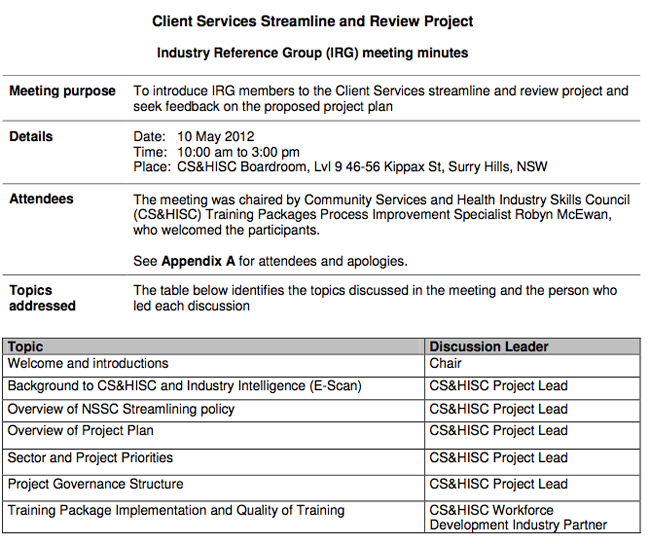
Welcome and introductions
Client Services Streamline and Review Project Industry Reference Group (IRG) meeting minutes
To introduce IRG members to the Client Services streamline and review project and seek feedback on the proposed project plan
Date: 10 May 2012
Time: 10:00 am to 3:00 pm
Place:
CS&HISC Boardroom, Lvl 9 46-56 Kippax St, Surry Hills, NSW
The meeting was chaired by Community Services and Health Industry Skills Council (CS&HISC) Training Packages Process Improvement Specialist Robyn McEwan, who welcomed the participants.
See Appendix A for attendees and apologies.
The table below identifies the topics discussed in the meeting and the person who led each discussion
Terms of Reference
The IRG agreed to the group’s Terms of Reference.
Chair selection
Robyn McEwan proposed to chair the meeting in the first instance and suggested that the IRG members nominate a chair in the succeeding meeting.
Representation
The IRG discussed current representation and agreed the need to broaden current membership to include The Attorney General’s Department and an organisation to represent Aboriginal and/or Torres Strait Islander interests to the IRG.
ACTION 1: CS&HISC to liaise with The Attorney General’s Department regarding representation and identify an organisation to represent Aboriginal and/or Torres Strait Islander interests.
Background and Industry Intelligence
The Chair provided a background to CS&HISC, the drivers behind the project and a profile of the community services and health industries.
Overview of NSSC Streamlining policy
CS&HISC Project Lead gave an overview of the National Skills Standards Council (NSSC) reform of Training Packages, in particular the implementation of the ‘streamlined’ design model for Training Packages.
Qualifications
- Qualifications reflect the job roles
- “Nested” qualifications are not allowed in new model – this includes move away from entry requirements where possible
- Focus on flexibility by keeping core units to a minimum and wide range of electives – however acknowledging that a qualification needs to describe the job role so if there are tasks that must be completed by all workers, these should be core
- Move towards skill sets to broaden skills and specialise
- Part of new design model although details have not been finalized by NSSC. (IRG will be informed when developments are made on this front).
- Reflect performance standards for specific job tasks
- Will be divided into two sections:
o assessment requirements
- Range Statement to be removed and replaced with a Range of Conditions.
- Foundation skills (ACSF + employability skills) section which is now are assessable but only in the context of the job role. Will not be assessed separately
- Move away from pre-requisite units as these denote “hidden effort” – these must only be kept if a job task requires formally assessed competence in a task before being able to undertake another task
- There is scope for the Assessment Requirements to be prescriptive and specific depending on industry needs e.g. How often does someone have to perform a skill to demonstrate competency? Where does it have to be done? Can it be done in a simulated environment?
- Move away from unit “levels” as units describe what a person does in their job, not the level it is performed (e.g. lower “level” admin units in a Diploma qualification)
- Quality assured “Implementation Guides” for users (industry, RTOs, learners)
- CS&HISC not funded to develop companion volumes, however will develop what is able to through the scope of this project.
The CS&HISC Project Lead gave an overview of the Continuous Improvement Process and led discussion surrounding the sector priorities and challenges influencing the project.
Sector Priorities and Challenges:
Employment Services and Careers:
- There is high turnover in employment services and the jobs are becoming more complex as the workers are dealing with people with increasingly complex needs. Staff are generally not well supported and skilled and therefore the client is not getting as good a service as they could
- No salary incentive for workers to complete the Certificate IV
- New standards in the Career Development industry that came into effect in January 2012.
- The IRG raised the benefit of Professional Associations registering members and endorsing RTOs to provide specific courses to industry. For example in the counselling sector, completing a qualification is not a gateway to employment as a Practitioner must be accredited by the Australian Counselling Association (ACA) in order to practice
- The ACA representative highlighted an issue where although Government has increased funding for Vocational Education and Training (VET) qualifications in the counselling sector, many employers including Government will not employ them as they want people qualified through the Higher Education (HE) sector. This is problematic because the sector does not necessarily need more people with clinical skills working with clients with non-clinical conditions and people are being trained with no employment outcome. It also means that the sector is losing mature people in the workforce as young people are more likely to undertake degrees. This seems to be largely due to a perception issue and stigma towards people holding VET qualifications which does not just pertain to the counselling profession
- ACA is currently looking to work with family law practices and also move into the space of weight-loss counselling
- Lifeline has moved away from using the term Telephone Counselling to describe their work
- Telephone Counselling is part of the role of a Financial Counsellor
- The representative for Family Relationships Services Australia (FRSA) gave an overview of the recent history of the sector and legislation including:
o In1996theFederalGovernmentfundedanumberofChildren’s Contact Services (CCS)
o The new Act stipulated that people who were separating with children were required to attend family dispute resolution (FDR) and obtain a 60i Certificate before they went to court. After applying the legislation, there was then no support to ensure that there were enough qualified workers to issue 60i certificates
o The Government later instituted a process of accreditation for FDR practitioners which requires them to undertake a number of units of competency in the current Vocational Graduate Diploma or obtain recognition of prior learning. - Positions in CCS are not very well paid and it is difficult work. There is a need to benchmark skills however it may be prohibitive for a workforce that is poorly paid and fairly casualised
- There is a trend that people who have been involved in mediation over the years come to work in FDR however there are a number of people that believe that FDR is very different to mediation i.e. mediation is impartial and FDR workers have to be child advocates
- Services also offer relationship education
- The majority of workers are also in the older age bracket which in a way is important because they bring some maturity and experience to the role. This demographic however, will further impact on current workforce shortages in the future. FRSA has developed a workforce strategy to try and look at ways for the sector to meet current and future demand
- In the past, people have usually come into the workforce from the HE sector however this has dissipated as the sector does not pay enough to attract these workers
- Services have a mix of fee paying and non-fee paying clients
- There is a need to attract more workers into the sector to work in the areas of alcohol and other drugs, mental health and domestic violence • Like other sectors, it is important to focus on prevention and early intervention rather than working at the end of the continuum
- In QLD prior to the change of Government there was a push for family support workers to provide support in people’s homes but there are WHS issues associated with this. This might be an issue to be addressed in the qualifications as there are 2 units in the Diploma but these are written from an organisational perspective not an individual perspective
- The group also agreed that there should be a unit added into the qualifications around reflective practice to assist people in stepping back from their personal experience and helping people with their issues. So workers have the ability to look after themselves and work with others to empower them
- The biggest thing for the community sector is looking after yourself and how not to get burnt out however it is not addressed in any of the qualifications.
- Recently a registration fee has been introduced and there is a view that it is not equitable as it does not apply to those working in a registry office and those working in a religious context The Coalition of Celebrants Associations (CoCA) views that there is also an issue that to be registered as a Celebrant, the worker only has to have completed one unit of competency not the entire Certificate IV which means some Celebrants are not adequately trained to work competently.
- For example there have been some instances where some Celebrants do not have the performance skills and are too shy to talk to people. To mitigate this, CoCA advocates the addition of 2 units of competency to the core of the Certificate IV. These include: CUSMPF303A – Prepare for Performance; and CUFWRT301A – write content for a range of media
- One RTO has trained approximately 80% of workers
- There is some talk of setting up regional advisory committees to facilitate appointing people based on community need and the demand for weddings as currently the market is flooded with over 10,000 celebrants when there is only enough work for 1,200 to make a full time living from the profession (need to facilitate approximately 100 weddings a year)
- Projecting into the future, there is thought that Celebrants could play a role in facilitating other types of rites of passage including “coming of age” ceremonies for 18 year olds to mitigate against the importance that drug and alcohol play currently in that space and connecting to older people (in the context of a growing ageing population) to personalise funerals as people tend to get an Undertaker to conduct the funeral. Currently Celebrants are working in these spaces for their own families but there could be a benefit to communities to do these more broadly
- Celebrants also require business skills as they are running their own business.
Diploma of Counselling:
- The ACA views that the current Diploma is appropriate as long as the worker is working within their skill level. e.g. mental health is a continuum with one end needing clinical support and the other end needing community support. With the latter served well by a worker trained with the Diploma qualification. The Diploma is also a good pathway to higher qualifications as people get experience in the sector
- The FRSA representative made an observation that there are increasingly people with a complexity of issues coming into services and one of the reasons services look to employ people with higher-level skills is so that worker can work with the person throughout the continuum as the Counsellor builds a rapport with the client and the client wants to remain with that worker. The additional challenge with the graduated process is that when you have a worker who ends up dealing with issues beyond their scope and they have to refer the client on
- The mix of HE and VET qualified staff can also create some disparity in teams e.g. when you have some clinical psychologists as well as financial counsellors working in a service and there is a status attached to their qualifications.
- The group thought that CS&HISC needs to ensure that career pathways are articulated really well and easily and there is a role for CS&HISC to push the message that you do not have to be degree qualified to be professional and look at all roles within a profession not just the VET roles.
- There has been an update to include 2 legal units. One of the units Ethics in the legal system does not reflect what the workers do in their job
- FAHCSIA has just released a tender for workers to be employed nationally as Problem Gambling Financial Counsellors. This gives more recognition to the role.
- Hunter Institute offers both the Certificate IV and Diploma but there are no job outcomes for the Diploma.
The CS&HISC Project Lead gave an overview of the project timeline and project phases.
National Information Forums have been scheduled during phase 1 (May and June 2012) to provide information to the wider sector.
Project Governance Structure
The Project Lead gave an overview of the proposed governance and consultation structure for this project.
The IRG provides cross-sectoral governance and strategic direction for the project. The Subject Matter Expert Groups (SMEGs) meet more frequently to advise and provide feedback on specific content related issues. Members of the SMEGs will be asked to contribute to a functional analysis of current job roles – this requires members to have experience in the job, or directly supervising the job.
The IRG agreed to the suggested SMEGs and were asked to provide nominations from their members.
ACTION 2: CS&HISC to distribute terms of reference and nomination form for SMEGs
ACTION 3: IRG to nominate appropriate members for SMEGs.
Workforce Development Session
The CS&HISC Workforce Development Industry Partner gave an outline of the CS&HISC workforce development strategies currently under developed to address training quality.
The IRG raised the following points regarding training delivery and quality:
- In NSW organisations are promoting fee-help to student and inferring that they will not have to pay it back as they will not earn enough. However it still affects their credit rating
- Regarding work placements (mainly in relation to the Diploma of Community Services work), there is increasing use of online delivery and training with no minimum requirement in training for field placement and supervision of work placement. ACWA is concerned that people could be presented with a qualification without having completed a work placement which is extremely dangeorus in a community service context. ACWA recommends that minimum hours for work placements be specified in the Training Package. CS&HISC Project Lead mentioned that there is the possibility to strengthen the requirements for work placement within the streamlined units.
Next Meeting
The IRG recommended next meeting to be held during Project Phase 2 & 3, after discussions with SMEG groups and draft 1 components have been drafted.
The Chair proposed to circulate an appropriate date once scoping of work has been carried out.
ACTION 4: CS&HISC to send out date for next meeting.
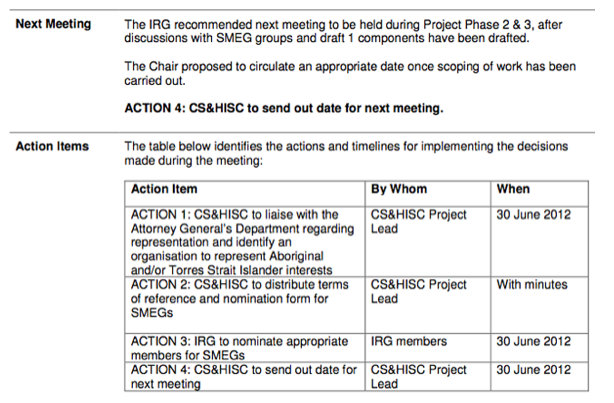
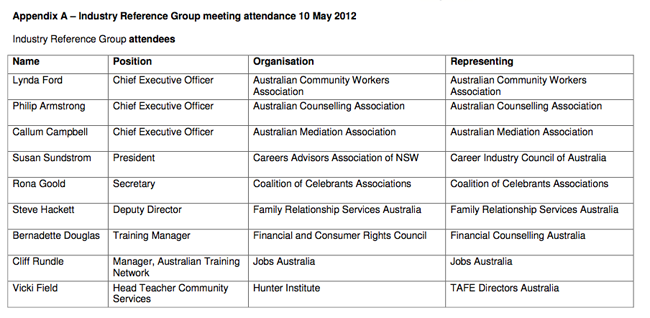

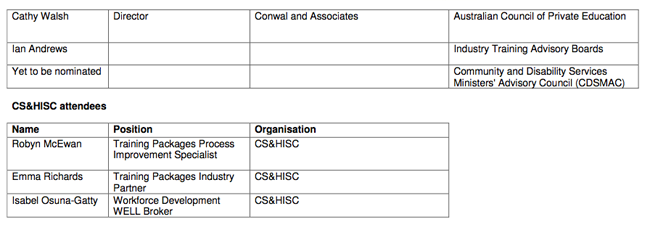
The Agenda of the first meeting, participants and apologies are listed here below.
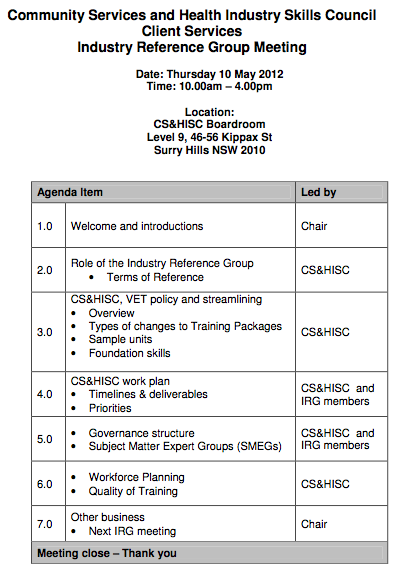
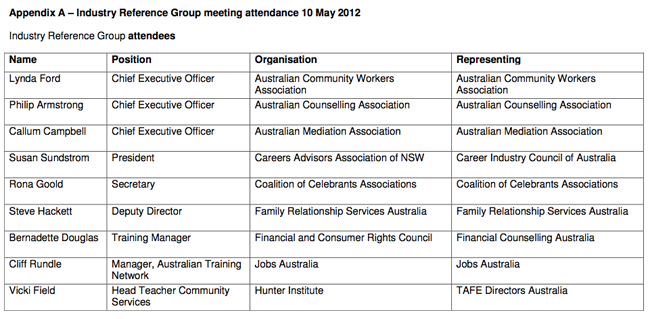

1. What are the current priorities, workforce development trends and challenges for your sector?
Consider training priorities, upcoming changes to the work or workforce, changes in service delivery/ funding and new legislation or regulations
2. Do the qualifications reflect current work roles? Are there any new or changing work roles emerging? Are the qualifications used? What critical changes are needed to assist the industry in meeting its skill needs?
Consider also pathways that currently exist and pathways that may be needed in the future
3. How are workers trained to meet the job requirements? Are there any issues regarding training and assessment?
Consider also contextualised training, challenges with delivery and regulation
4. What sector-specific developments (trends) impact on the qualifications?
5. What cross-sector developments (trends) impact on the qualifications?
6. Are there any reference materials to inform the project on issues/ trends for your sector?

